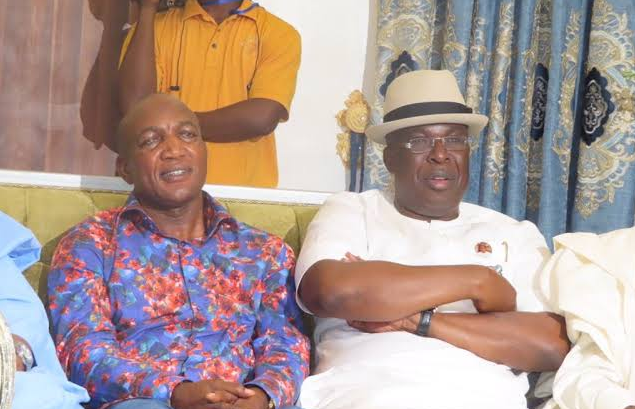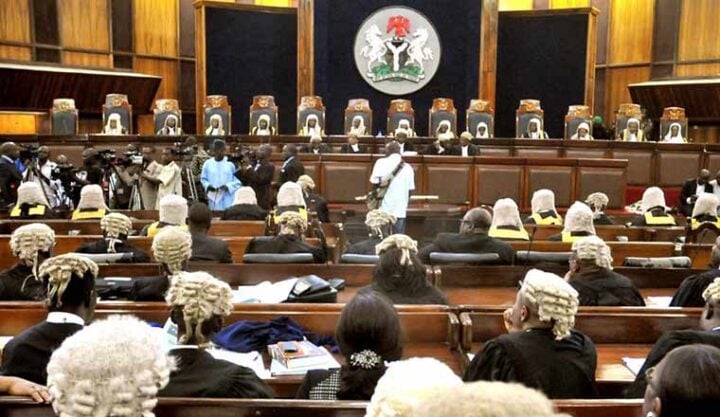Pic .15. INEC Chairman, Prof. Mahmood Yakubu briefing on 2019 rescheduled 2019 General Elections at the International Conference Centre in Abuja on Friday (22/02/19).
01609/22/2/2019/Sumaila Ibrahim/NAN
On a hot, dusty harmattan day last week, the Independent National Electoral Commission (INEC) loaded its gun, and pulled the trigger, terminating 74 political parties. The grieving remnants were left to bury their dead in what seemed a most unkind Valentine gift.
A number of the leaders of the affected parties have refused to be consoled. They have vigorously expressed their displeasure, with a few even threatening court action.
The presidential candidate of the Abundant Nigeria Renewal Party (ANRP), Tope Fasua, for example, accused INEC of pursuing a policy that suggests that the commission expected the parties to “win by all means and at all costs,” saying that even though they had given it their best, the commission is being used by the ruling All Progressives Congress (APC), to “hang” the 74 parties.
On the whole, arguments back and forth tend to concede INEC’s powers under the amended electoral law to register and delist parties. The sticky point appears to be whether, in this instance, INEC has used its powers judiciously, fairly and transparently.
Advertisement
The ruling party not only thinks INEC has done well, it thinks the commission has not even gone far enough. A state chapter chairman said he could not for the life of him understand why the commission should register “husband-and-wife” parties that should not have been permitted to exist outside “the other room”, in the first place. Precisely what arrogance says when the wind is in its sails.
In his response, the ANRP presidential candidate said it was unacceptable for the Commission to pocket N1m from his party as registration fee, ask it to set up structures and recruit staff all across the country, only to administratively terminate the party less than two years after.
Leading human rights lawyer and senior advocate, Femi Falana, took the matter even further. He said while he conceded that INEC was authorised by law to delist parties, there were two unattended problems in the present case: 1) since local government elections have not taken place in 13 states, it would be premature to conclude that all 74 parties have failed the minimum retention test; 2) the delisting should apply not only to parties that failed to win any seats across board – that is at local, state and national levels – but also to those who have failed to file financial returns, including the audited accounts of their parties.
Advertisement
On its part, INEC has said it took the decision after field reports from the last general elections. It has not, however, provided the extent and details of its findings and the reaction of a number of the parties involved indicate that the action took them by surprise.
It also remains unclear if the decision took into account the outstanding local government elections in some states and the requirement of the law with respect to the fiduciary obligations of the parties.
As a voter, one aspect of the last general elections that I found particularly daunting, was the serpentine list of parties in a forest of colours, logos, party names and symbols on each ballot. Voting was not simply a matter of thumbing ink in the box of the party of your choice.
Since quite a number of the party names and symbols were similar, you had to take extreme care to navigate the jungle to find the party of your choice. And when you finally did, you had to take care to thumbprint, because the crowded field on the ballot left very little room for maneuver.
Advertisement
Not a few of the voters in my booth and other places where I visited afterwards openly and profusely asked for help – against the rule – just to find the party of their choice.
Yet at the end of the exercise, when the tally was taken, scores of votes were voided in my booth as a result of protests by overzealous agents or party supporters who claimed the ink in some ballots had only marginally crossed the marked area on the crowded ballot.
There were also roars of disapproval about how some parties down the “pecking order” had gained “stray votes”, not because the voters intended to vote for them but simply because their names sounded like those of the more widely known political brands.
The difference may not mean much in areas where either of the main parties dominate, but in tight spots every single vote could potentially affect the outcome.
Advertisement
I fully understand the sentiment behind the upsurge in political parties. In the last 20 years or so, the political space appears to have been deliberately rigged in favour of moneybags and well-heeled politicians who have recycled and continue to recycle themselves.
The demographics in the bulk of the newly registered parties reflect relatively young professionals, newcomers and political outsiders who are thoroughly fed up with business as usual. It would seem unfair to continue to shut them out or to press them into the old wineskin already fraught with the recipe for their own self-destruction.
Advertisement
As things stand today, I think it’s a waste of time hoping that INEC would reverse the ban or that it would provide comfort to the affected parties. It would not happen.
Yet, there are lessons, going forward. INEC can swear that it has been fair and transparent, but if only the ruling party believes it, then there’s a big problem. The criteria for administrative termination appear to give preeminence to performance on the field during elections above everything else.
Advertisement
That is important, but even on that field we have seen situations where governors have managed to thwart local government elections for years without consequences.
Such hostage politics favours the more established parties, especially the two major ones, further skewing the field against the newer ones. But way and beyond any effect of this sort of politics is how closely INEC is monitoring the compliance of all the parties to their fiduciary obligations.
Advertisement
The electoral law empowers the commission to delist parties that fail to meet a threshold at elections. But it also sets failure to comply with financial obligations, including observing campaign funding limits, declaring and publishing sources of party funds, and filing audited accounts, among others, as sufficient grounds for administrative termination.
Did the commission take statutory financial reporting into account in the decision to delist parties and if so, when will the record be made public?
The delisted parties – and others who may apply in future – need not despair. At least, three other jurisdictions – the US, Canada, South Africa and Ghana – offer profitable examples.
What is common to all is flexible registration. That means, for example, that unlike here where parties must register as “national parties”, build party offices and structures throughout the country, and have membership that runs across every ward and village, parties in these other jurisdictions don’t need that.
In these countries, they register at the local, state or federal level, depending on their interests or the issues they wish to advance. Why should a party that is concerned about getting Almajiris off the streets, for example, be concerned about registering as a “national” party or a farmer’s party be required to have offices in Abuja?
In the four countries mentioned above, strict financial guidelines about campaign funding and expenses exist and could, as in the particular case of the US, for example, determine the threshold for classification or administrative termination.
Instead of splitting hairs over INEC’s ban – which will happen over and over again – we must address startling inadequacies in the electoral law which permitted the travesty, in the first place.
Ishiekwene is the MD/editor-in-chief of The Interview.
Views expressed by contributors are strictly personal and not of TheCable.
Add a comment







